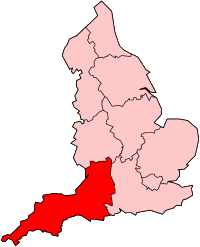| Formerly | South Western Electricity Board |
|---|---|
| Founded | 14 August 1947 |
| Defunct | 10 December 1993 |
| Parent |
|
SWEB Energy, formerly South Western Electricity Board (SWEB) was a British state-owned regional electricity company operating in South West England which was privatised by the Thatcher government. Although sold many times, the 'SWEB' brand name survived until 2006.
Contents
- South Western Electricity Board (SWEB)
- Existing electricity suppliers taken over at nationalisation
- Company timeline
- References
- External links
The distribution network operator for the former SWEB area is now National Grid Electricity Distribution. The incumbent electricity retail company is EDF Energy.


